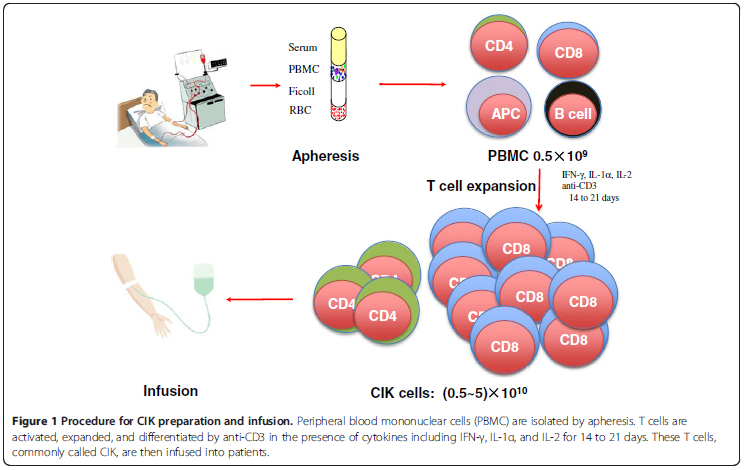ńĀöń®ČĶ½¢µ¢ć
Cytokine-induced killer cells promote antitumor immunity
NK
Author
Master
Date
2015-06-21 14:12
Views
711
This research is different from general immunotherapy method using autologous cells in Japan. But they get pbmc through apheresis and have cultivated by 10 ~ 50 times. This clinical studies applied to various tumors like Hepatocellular carcinoma, lymphoma, Gastric carcinoma and so on.
Cytokine-induced killer cells promote antitumor immunity(2013)
Jingting Jiang, Changping Wu and Binfeng Lu
Abstract
The number of immune cells, especially dendritic cells and cytotoxic tumor infiltrating lymphocytes (TIL), particularly Th1 cells, CD8 T cells, and NK cells is associated with increased survival of cancer patients. Such antitumor cellular immune responses can be greatly enhanced by adoptive transfer of activated type 1 lymphocytes. Recently, adoptive cell therapy based on infusion of ex vivo expanded TILs has achieved substantial clinical success. Cytokine-induced killer (CIK) cells are a heterogeneous population of effector CD8 T cells with diverse TCR specificities, possessing non-MHC-restricted cytolytic activities against tumor cells. Preclinical studies of CIK cells in murine tumor models demonstrate significant antitumor effects against a number of hematopoietic and solid tumors. Clinical studies have confirmed benefit and safety of CIK cell-based therapy for patients with comparable malignancies. Enhancing the potency and specificity of CIK therapy via immunological and genetic engineering approaches and identifying robust biomarkers of response will significantly improve this therapy.
The cellular characteristics of CIK
CIK cells are generated by in vitro expansion of peripheral blood lymphocytes (PBL) using anti-CD3 antibodies and IL-2. Short-term culture of human PBLs with IL-2 allows for proliferation and development of effector NK and nonspecific T-cells, with lymphokine-activated killer (LAK) activity. LAK activity enables lysis of fresh tumor targets in a non-MHC restricted manner in vitro and also exerts in vivo anti-tumor effects.
.........skip...........
Conclusions
Current clinical studies suggest that CIK is a promising and safe modality for treating malignancies. Multicenter
clinical trials are warranted to further establish the validity of this therapeutic approach and optimize the CIK treatment protocol. This therapy should be further improved through increasing the specificity of CIK cells via immunological and genetic engineering approaches and identifying robust predictive biomarkers for patient stratification. In addition, we believe combining chemotherapy, radiotherapy or other immunotherapy approaches
with CIK will further improve cancer therapy and prolong survival of cancer patients.
Source:http://www.translational-medicine.com/content/11/1/83

Total 0
